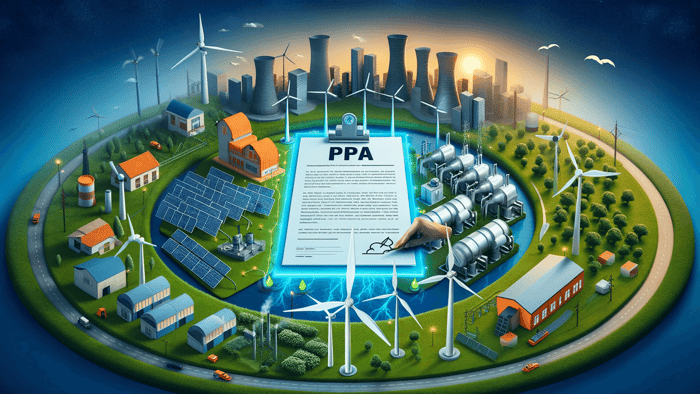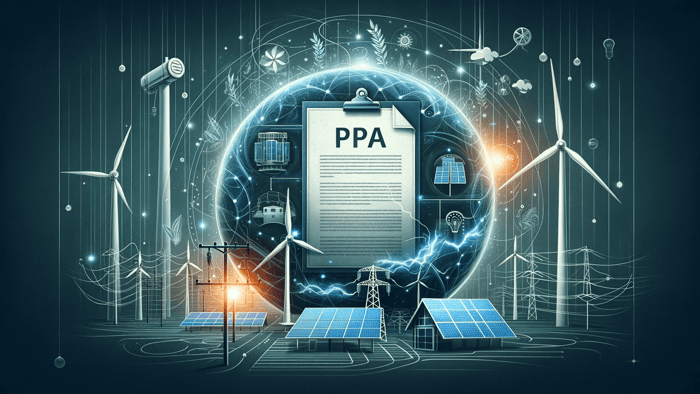A Power Purchase Agreement (PPA) is a foundational instrument in the energy sector, especially within the realm of renewable energy. PPAs serve as crucial contracts between electricity generators and off-takers, facilitating the sale and purchase of energy. This article delves into the essence of PPAs, their purpose, alternatives, and the nuances that distinguish them. It further explores the motivations of involved parties, typical contractual durations, and the financial implications, providing a comprehensive overview of the key matters of a Power Purchase Agreement (PPA).
What is a Power Purchase Agreement (PPA)?
A Power Purchase Agreement (PPA) is a contractual agreement between two parties: the Electricity Generator (Seller) and the Electricity Off-taker (Buyer). This agreement stipulates the terms under which electricity is generated, sold, and purchased, ensuring a steady revenue stream for the generator and a reliable electricity supply for the off-taker.
The Purpose of PPAs
· Critical Role in Financial and Asset Structuring: PPAs play an essential role in the financial setup and structuring process of renewable energy projects, ensuring the project’s predictability of future cash flows and cash flow stability.
· Securing Contracted Revenues: A Power Purchase Agreement acts as a mechanism to secure contracted revenues at a fixed price, making them essential for seeking financing or debt from financial institutions.
· Certainty of Future Cash Flows: The fixed price agreements provide certainty of future cash flows, making the business case forecasts more predictable and reliable.
· Enhancing Project Viability and Appeal to Investors: The predictability in cash flows enhances the project's viability and attractiveness to lending institutions and conservative equity investors who prefer return predictability and certainty over upside potential.
Alternatives to PPAs
- State-Subsidized Feed-in Tariffs (FiTs): Without a PPA, electricity may be sold under FiT schemes that offer fixed payment rates for generated renewable energy. Examples include:
- Germany’s EEG
- The UK’s Renewable Obligation Certificates
- Japan’s FiT program
- Electricity Spot Market: Alternatively, electricity can be sold directly on the spot market, where prices fluctuate based on demand and supply. Prominent spot markets include:
The Relevance of Differentiating Power and Capacity in PPAs
In the context of a Power Purchase Agreement (PPA), understanding the distinction between electricity and installed capacity is crucial. This knowledge aids in accurately structuring agreements, forecasting energy production, and aligning financial expectations between the generator and the offtaker. Here are the key distinctions:
· Electricity (MWh): Represents the actual energy produced and delivered, typically measured in megawatt-hours. This measurement quantifies the volume of energy generated over a specific period.
· Installed Capacity (MW): Refers to the maximum output a generation facility can produce, typically measured in megawatts. It indicates the potential production capability of a power plant.
PPA Contract Durations and Pricing Impact
Understanding the relationship between the duration of a Power Purchase Agreement (PPA) and its pricing is essential for both electricity generators and offtakers. This understanding helps in tailoring the terms of the agreement to meet the financial and operational objectives of both parties.
· Typical Duration: PPA contracts typically have a duration ranging from 1 to 25 years. This wide range allows for flexibility in meeting the specific needs and goals of the contracting parties.
· Impact on Pricing: Generally, the price offered in a PPA decreases the longer the duration of the contract. This is because longer contracts provide more stability and predictability for both parties, which is often reflected in more favorable pricing terms for the off-taker.
Motivation of PPA Off-takers
The motivations behind organizations entering into a Power Purchase Agreement (PPA) as off-takers are multifaceted, primarily focusing on economic and environmental objectives.
· Long-Term Price Certainty: PPA off-takers, which include utilities and corporations, pursue PPAs for the long-term certainty they offer in energy pricing. This allows for better financial planning and risk management in relation to energy costs.
· Fulfillment of Environmental Obligations: Many off-takers are motivated by the need to meet environmental obligations. Engaging in PPAs for renewable energy helps them reduce their carbon footprint and support sustainability goals.
· Bolstering ESG Profiles: Major global corporations like Google, Amazon, and Microsoft use PPAs as a tool to enhance their Environmental, Social, and Governance (ESG) profiles. By committing to renewable energy through PPAs, they demonstrate leadership in sustainability and corporate responsibility.
Advantages and Disadvantages of PPAs
PPAs offer distinct benefits and pose certain challenges for both asset owners and offtakers, impacting their operational and financial planning.
Advantages
- Stable Revenue Stream for Asset Owners: PPAs provide asset owners with a guaranteed and stable revenue stream, enhancing financial stability and precictability.
- Facilitation of Project Financing: The certainty associated with PPAs makes it easier for asset owners to secure financing for renewable energy projects.
- Consistent Supply of Renewable Energy for Off-takers: Off-takers benefit from a steady and reliable supply of renewable energy, contributing to their sustainability goals.
- Predictable Prices for Off-takers: PPAs offer off-takers long-term price certainty, aiding in budget and financial planning.
Disadvantages
- Contractual Rigidity: The fixed terms of PPAs can be rigid, limiting flexibility for both parties to adapt to changes over the contract duration.
- Potential Misalignment with Future Market Conditions: The long-term nature of PPAs may result in terms misaligned with future market conditions, possibly leading to less optimal financial or operational outcomes for either party.
Summary of a Power Purchase Agreement (PPA)
A Power Purchase Agreement (PPA) stands as a cornerstone in the renewable energy sector, enabling the transaction of energy between generators and off-takers.
· Definition and Purpose: A PPA is a contractual agreement between an electricity generator and an off-taker, designed to ensure a consistent revenue stream for the generator and a reliable supply of energy for the off-taker. It plays a vital role in the financial structuring of renewable energy projects by offering long-term price certainty and facilitating the procurement of financing.
· Alternatives to a PPA: In scenarios without a PPA, electricity may be traded through state-subsidized feed-in tariffs (FiTs) or on electricity spot markets. Examples include Germany’s EEG, the UK’s Renewable Obligation Certificates, and markets like the European Power Exchange (EPEX) and the Nord Pool.
· Understanding Power and Capacity: Distinguishing between electricity (measured in MWh) and installed capacity (measured in MW) is crucial within a PPA context for effectively structuring agreements and accurately forecasting energy production.
· Contract Durations and Pricing Impact: The duration of a PPA can vary from 1 to 25 years, directly affecting the pricing structure. Generally, the price within a PPA tends to decrease as the contract length increases, offering more stability and predictability to both parties involved.
· Motivation of Off-takers: Off-takers, including leading corporations like Google, Amazon, and Microsoft, seek PPAs for the long-term price certainty they provide, the opportunity to fulfill environmental obligations, and to bolster their Environmental, Social, and Governance (ESG) profiles.
· Advantages and Disadvantages: While a PPA ensures a stable revenue flow for generators and facilitates project financing, its fixed terms can lead to contractual rigidity and potential misalignment with future market conditions.






